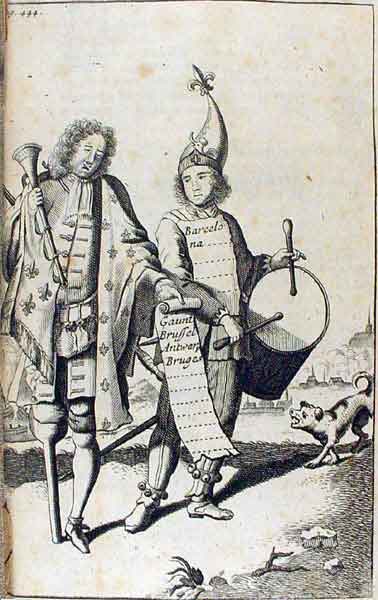
A "French Trumpet and Drum" (1707)
 |
This satirical engraving is taken from a series of seven, all satirizing the French King Louis XIV and his allies, that appears in the fourth volume of the important and popular satirical anthology, Poems on Affairs of State. The engravings relate to the defeats suffered by the French alliance in the War of the Spanish Succession in the year 1706; the series is introduced by the following note:
| A Collection of some Satyrical Prints, publish'd beyond Sea, relating to the Affairs of Europe, since the French King plac'd his Grandson on the Throne of Spain. With their Explanations in English. |
|
[Poems
on Affairs of State, Vol. 4 (London, 1707) 435.]
|
The engraving depicts a French drummer and trumpeter in their roles as heralds seeking news of recent French disasters from the inhabitants of the Netherlands. The Dutch were one of England's primary allies in the war, and were themselves under considerable threat of French invasion. The implication, of course, is that the French forces had been battered (here graphically represented by the maimed trumpeter), defeat having rendered them so ill-informed that they needed to inquire of their enemies as to the current state of hostilities: the transformation of these two from their traditional role as heralds, announcing victories, to that of bewildered intelligence-gatherers makes an essential satirical point.
The trumpeter holds a ledger that lists four towns of the Low Countries (Flanders, in modern Belgium) recently captured from the French, Gaunt, Brussels, Antwerp, and Bruges; the Drummer wears a second ledger that lists Barcelona, in Spain, as another French loss. The engraving is faced, on the recto of the next leaf, with a versified "explanation" that imagines the heralds pleading for both information and military equipment for the depleted French forces from the very people that Louis XIV sought to conquer:
| These Figures represent a French Trumpet and Drum sent by Louis le Grand, to enquire News of several Citys lost by the Mighty Monarch last Campaign, 1706. |
|
|
|
[Poems on Affairs of State, Vol. 4 (London, 1707) 444.] |
The War of the Spanish Succession began formally in May of 1702, with the declaration of war against France by England and Holland. In some regards, this war was really an expression of William III's ongoing policy of containing French expansionism on the Continent; the last conflict with the French, the War of the Grand Alliance, had ended in something of a stalemate with the Treaty of Ryswick in September of 1697. An important issue left unresolved by this peace treaty was the question of the succession to the Spanish throne. Charles II of Spain was mentally ill, and childless, and it had long been apparent that there would be conflict between the two claimants to the throne, Philip of Anjou (a Bourbon) and Archduke Charles of Austria (a Hapsburg). As the former was grandson of Louis XIV, a Bourbon succession raised the prospect of a united French and Spanish empire that would undoubtedly dominate both the new world and the old. This development William III, and most other European monarchs, were determined to oppose.
Charles of Spain died in 1700, leaving a will that bequeathed his throne to Philip of Anjou, who was promptly recognized by Louis as Philip V of Spain; when Louis further recognized James Francis Edward Stuart — the "Old Pretender" — as the legitimate King of England upon the death of the ousted monarch James II in 1701, war with England became inevitable. William assembled a new "Grand Alliance" of Continental powers to oppose French ambitions, and recognized Charles of Austria as Charles III of Spain.
Although William died shortly after his declaration of war, his successor, Queen Anne, determined to carry on the war, appointing the John Churchill, the Duke of Marlborough, as Captain-General of British forces abroad. Under his command, the Alliance achieved an impressive victory at Blenheim in 1704; Gibraltar was captured by the British Navy in the same year, and Barcelona in 1705.
1706 was the high-water mark for allied war efforts: following a brilliant victory at Ramillies, Marlborough was able to expel the French from the Low Countries, while Marlborough's ally, Prince Eugène of Savoy, beat the French forces in Italy at Turin. In Spain, allied forces captured Madrid, expelling Philip V from his capital. These achievements are the focus of the satirical/panegyrical plates published in Poems on Affairs of State, itself a virulently Whig — and hence, pro-war — collection that was intended, in part, to bolster popular support for the war effort.
Allied fortunes ebbed somewhat in the years that followed the annus mirabilis of 1706; the Grand Alliance suffered a severe defeat in Spain at Almanza in 1707, and increasingly pyrrhic victories by Marlborough at Oudenarde in 1708 and Malplaquet in 1709 made it evident that a complete defeat of France was not possible. Meanwhile, opposition to the prolonged war grew in England, resulting in the fall of the Whig government in 1710, and its replacement by a pro-peace Tory regime lead by Henry St. John and Robert Harley. In 1713 the Treaty of Utrecht took England out of the war (a betrayal of its allies that earned it the sobriquet "perfidious Albion"): Philip V was recognized as King of Spain, but this kingdom was not permitted to unite with France under a single crown. Meanwhile, England regained most of its lost territories (mostly in North America), and added Gibraltar and Minorca to its possessions. The Protestant succession in England was recognized by Louis, and English merchants were granted the lucrative Asiento, permitting them to engage in the slave trade in Spanish America. The passing of this treaty in Parliament created a major political firestorm in England, and was, in part, responsible for the fall of the Tory ministry in 1714.
Plate reproduced from:
| Poems on Affairs of State, From 1620. to this present Year 1707. Many of them by the most eminent |
|
|
ESTC t144916 |
 |
Website maintained by: Mark
McDayter
Website administrator: Mark McDayter
Last updated: April 25, 2002